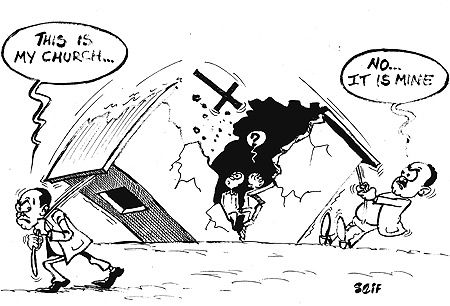Local Church Power Struggles examines the power battle in most local churches, focusing on God should be controlling it.
Many churches fail because they are battlefields over control of the church.
Rich people donate when the minister “listens to” what they have to say. Often it is more obey. They hold back their donations (which the church needs) because the pastor does not heed what their opinion is.
In other churches, the problem is the opposite extreme. The pastor is a dictator and just will not listen to anybody no matter what. He uses different tactics of control to keep people.
In both cases, these kinds of people miss the entire point of church. A church is created by God for the glory of God, and this focuses on (1) doing the will of God, the salvation of souls, and the edifying of the saints in their spiritual lives, (2) the equipping of the saints to do the work of the ministry. Control by one group against another is nowhere in this purpose of God.
In fact, God should be in total control of the church. Decisions need to be made, and some provisions for the needs of the church need to be attended to by the church, especially the leaders. But notice the difference between the power play I outlined above, and this God controls His church.
When God is in control, EVERYBODY in the church is worried about discerning and doing the will of God. That means their own personal way of doing things takes “a backseat” to searching for God’s will, understanding it, and executing it. In general, the pastor presents the will of God in his teaching and sermons. But again, he sets his own will aside in search of the will of God. The only reliable conclusion that the pastor can make is when there are specific verses of Scripture, spiritual principles, that outline the disposition and activities of the church.
The idea that the church should use modern worldly marketing techniques, as well as “going after the big money,” by catering to the rich, is totally opposed to God’s principles.
James 2:1 My brethren, have not the faith of our Lord Jesus Christ, the Lord of glory, with respect of persons.
James 2:2 For if there come unto your assembly a man with a gold ring, in goodly apparel, and there come in also a poor man in vile raiment;
James 2:3 And ye have respect to him that weareth the gay clothing, and say unto him, Sit thou here in a good place; and say to the poor, Stand thou there, or sit here under my footstool:
James 2:4 Are ye not then partial in yourselves, and are become judges of evil thoughts?
God forbids partiality. This means that people are automatically considered “good” or “desirable” because of their political power maybe in civil government, their place over a business, maybe even being some kind of star, actor, or sports personality. But the idea behind not being partial is that people define themselves by their character, the actions and words that flow from that character, and the evidences of their personality. The view is their spiritual likeness to Christ.
When a person is elevated to be an informal leader because of popularity, because of some factor other than their proven Christian life, that is what James is referring to in this passage.
See ch55 Who runs the Local Church?
Why Churches Fail: Control
